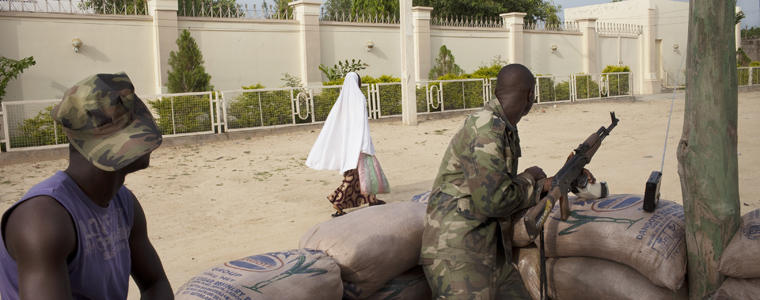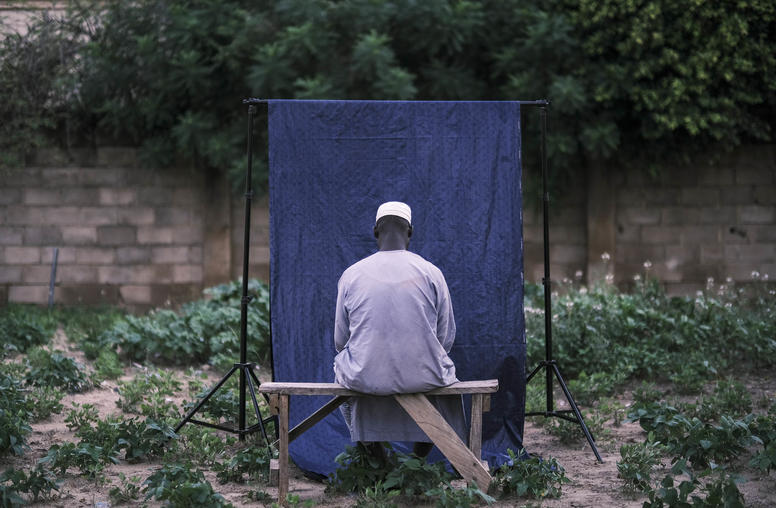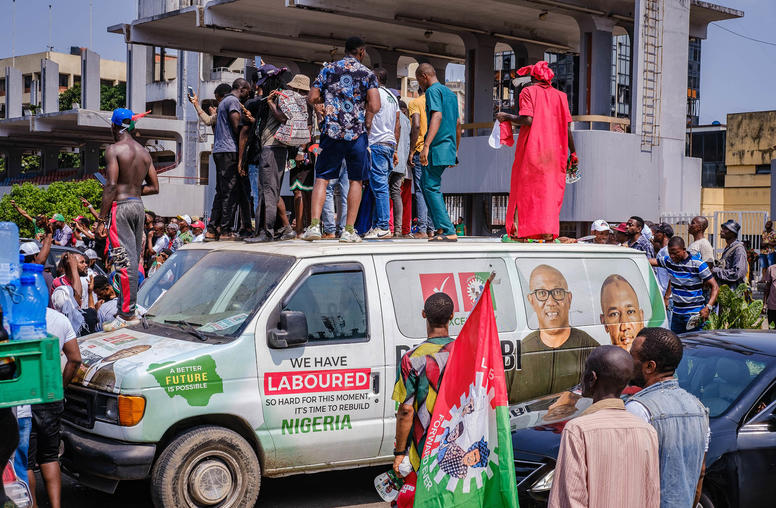Nigeria’s State of Emergency May Spread Amid Violence, Politics
Experts say extremist violence and the government’s response are renewing and exacerbating tensions in multiple sections of the country, as political parties begin to jockey for position in the 2015 elections.

May 28, 2013
The state of emergency that President Goodluck Jonathan declared in three northern states of Nigeria in response to attacks by the extremist Islamist sect Boko Haram could well extend to a wider swath of the country, according to John Paden, a professor at George Mason University in Virginia who is a noted expert on Africa.
“We may see other states get wrapped up into this as well,” said Paden, who helped start a university in Nigeria and has authored a textbook series on Africa. “There are at least 11 states that have serious crisis problems.”
Paden spoke as part of a panel discussion at the U.S. Institute of Peace in Washington on May 21 to mark the publication of two USIP Special Reports on Nigeria. One report by fellow panelist and political risk consultant Aaron Sayne explores security in another region, the Niger Delta, while the second, written by Paden, analyzes the nascent political party system and the potential for violence in the run-up to the next elections in 2015.
Nigeria faces a multitude of risks today, from Boko Haram’s threats to the country’s stability and integrity -- and an official response that may be alienating potential government allies -- to the unresolved tensions in the Niger Delta in the south. Layered atop both is the political struggle over whether Jonathan should be allowed to run for re-election, based on the constitution and his own political party’s rules. The fight pivots on the competition for representation between the north and the south.
Media focusing on Africa have reported that security and Jonathan’s response to the violence in the north may have prompted U.S. President Barack Obama to skip Nigeria again as he prepares for a second visit to Africa in June, this time to Senegal, South Africa and Tanzania.
“Nigeria is in a state of crisis,” said David Smock, USIP’s senior vice president for its Centers of Innovation and a longtime Africa expert. “Only a few years ago, the Niger Delta was considered the main threat to the stability of the country.”
Nigeria has a history of electoral violence. The 1964 campaign, for instance, was the “tipping point” to what became a civil war, Paden said. That conflict remains the “marking trauma of the Nigerian state,” he said. More recently, the 2011 national elections were rocked by extreme violence in the north.
Jonathan’s decision to proceed with declaring the state of emergency despite advice to the contrary from elders and politicians in the north and his service chiefs signals his likely motivations, Paden said.
“This is very clearly the opening volley in the campaign for the re-election of President Jonathan,” Paden said, noting that Jonathan also has taken to appearing in full-dress military uniform.
The decisions prompted a statement from Secretary of State John Kerry saying the U.S. is “deeply concerned about the fighting in northeastern Nigeria following President Jonathan’s declaration of a state of emergency in the Borno, Yobe, and Adamawa states.”
“We are also deeply concerned by credible allegations that Nigerian security forces are committing gross human rights violations, which, in turn, only escalate the violence and fuel extremism,” Kerry said in the May 17 statement. “The United States condemns Boko Haram’s campaign of terror in the strongest terms. We urge Nigeria’s security forces to apply disciplined use of force in all operations, protect civilians in any security response, and respect human rights and the rule of law.”
Even the oil-rich Niger Delta area in the south may be quiet now only because “their man is president,” Paden said. That could easily blow up if Jonathan doesn’t gain another term in office, he said.
Two potential flashpoints could erupt into more pronounced conflict in the Niger Delta, said Sayne, who is principal at 104 Consulting. Either the 2015 election could “go badly” in a variety of ways, or organized crime could get so far out of control as to affect security.
Both factors rely on the actions and reactions of political figures and militants who’ve been reintegrated into government through an official amnesty program established to quell the uprisings in the south, Sayne said.
Smock noted that four close advisers to Jonathan visiting Washington last month clearly conveyed their rationale that the president has to run for re-election because otherwise the Niger Delta will erupt again and become ungovernable.
The Niger Delta amnesty had been more successful than most people predicted and contributed to a “fairly durable” peace, but it’s now “fraying and declining,” said Peter Lewis, associate professor and director of African studies at Johns Hopkins University’s School of Advanced International Studies.
“Today we see especially acute divisions and fragmentation in Nigeria,” Lewis said. They include insurgencies in the north and north east, the state of emergency and violence elsewhere that extends beyond extremist Islamist groups to another cult that isn’t either Christian or Muslim but animist and whose members recently killed dozens of police officers.
At the same time, other areas are booming, Lewis said. He cited the port city of Lagos in the southwest as an example, with its telecommunications, banking and other industries and young high-tech entrepreneurs setting up shop and local governing structures that are increasingly effective and largely outside the control of the central state.
So, while the Nigerian security forces have shown they can quell insurgencies, however brutally, “governance and legitimacy in those regions and more broadly across the country are greatly strained,” Lewis said.



